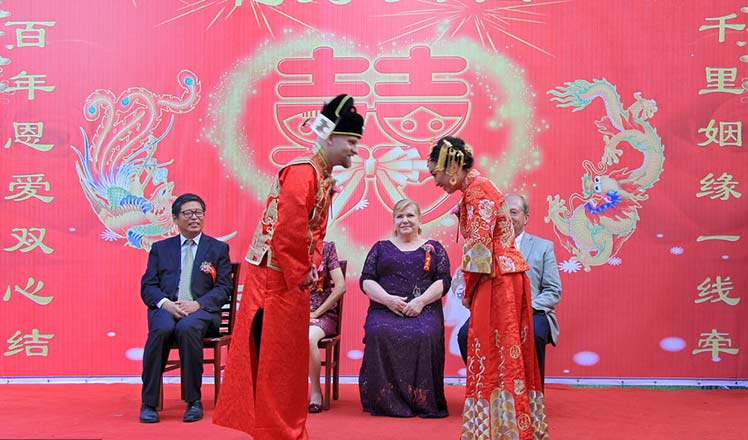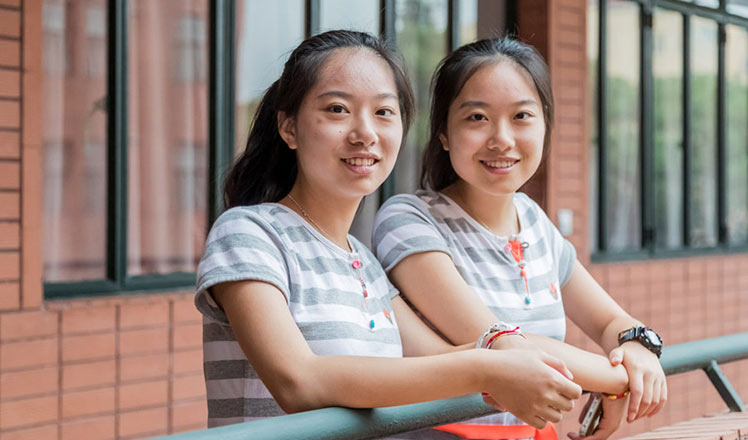Progress in judicial protection of rights
Updated: 2016-09-13 07:36
(China Daily)
|
||||||||
 |
|
A bailiff introduces visitors to a judge's robe at Fujian Provincial High People's Court in Fuzhou on the Open Day on Aug 25, 2016. [Photo by Zheng Shuai/China Daily] |
China strives to fully protect people's rights and interests as the nation advances comprehensive rule of law
Editor's note: The State Council Information Office of the People's Republic of China on Monday issued a white paper on new progress in the judicial protection of human rights in China. Following is the full text of the document.
Foreword
Respecting and protecting human rights is a constitutional principle in China. It also reflects the will and pursuit of the Communist Party of China (CPC), the Chinese government and the Chinese people. The judiciary is the last line of defense to safeguard social fairness and justice, and judicial protection of human rights is an important part of human rights progress in a country. In recent years, especially since the 18th National Congress of the CPC, China has upheld the dominant position of the people, taking a people-first approach and ensuring that the people are the masters of the nation. The state strives to ensure the rights of the people, fully protects their interests, and promotes legislature based on rational analysis, strict law enforcement, judicial justice, and observance of the law by all citizens. Progress has been made in modernizing the system and capacity of state governance. China has effectively protected the people's rights and freedoms in an extensive array of fields in accordance with the law, while its people duly fulfill their obligations.
As China enhances the rule of law in all respects, new progress has been made in human rights protection in the field of justice. The reform of the judiciary has been driven to a deeper level, with improvements in the allocation of judicial powers and responsibilities, judicial accountability and opening-up, and the protection of lawyers' right to practice their profession. Channels of public participation in justice have been expanded, and the judicial protection of human rights has been improved. China has implemented a case-filing register system, revamped and improved its litigation system, and strictly enforced principles of legality, in dubio pro reo, exclusion of unlawful evidence. The state is resolute in preventing and correcting miscarriages of justice, and the procedures for protecting human rights in judicial practice have been raised to higher standards. The judiciary exercises its power independently and impartially in accordance with the law, leading to strengthened public credibility. Further efforts have been made in terms of state compensation and legal aid. Judicial fairness and justice is safeguarded, and citizens' rights are effectively protected. Crime suspects, defendants and criminals are treated in a more civilized manner, punishments are meted out in a more standardized way, and the personal dignity, safety, and legal property of detainees are all well protected, as are their rights of appeal, accusation, and impeachment.
There is no end to mankind's pursuit of progress. There is still much room for improvement for the rule of law in China. Strengthening judicial protection of human rights will continue to be a major task in implementing the rule of law. China will proceed from its prevailing reality, learn from the achievements of other countries regarding the rule of law, enhance judicial protection of human rights, safeguard social fairness and justice, and implement the rule of law in all respects.
I. Strengthen the Mechanism of Judicial Protection of Human Rights
China is striving to drive reform of the judiciary to a deeper level, allocate judicial powers and responsibilities in a more rational way, improve the judicial accountability system, promote judicial transparency, establish a national judicial assistance system, and ensure the right of lawyers to practice their profession and the rights of citizens to act as assessors and overseers.
Further improve the allocation of judicial powers and responsibilities, and ensure the independent and impartial exercise of the judicial and procuratorial power. Major plans for deeper reform of the judiciary were made at the 18th National Congress of the CPC and the third and fourth plenary sessions of the 18th Central Committee of the CPC. In 2014-2015, the Central Leading Group for Deepening Overall Reform held 19 meetings, 13 of which involved reform of the judiciary. The Group examined and approved 27 judiciary reform documents in total. Public security organs have improved the mechanism of law enforcement, changed the case-filing review system to case-filing register system, and strengthened examination and supervision of case admitting work. The Supreme People's Procuratorate has issued the "Opinions on Deepening Procuratorial Reform (Work Plan for 2013-2017)," and the Supreme People's Court has released the "Opinions on Deepening the Reform of People's Courts in All Respects-the Fourth Five-Year Reform Plan of the People's Courts (2014-2018)." Since 2014, pilot programs have been promoted nationwide to improve performance in the following areas: judicial accountability, category-based management of judicial personnel, job security for the judicial profession, and unified management of the personnel, finance and property of people's courts and procuratorates below the provincial level. The reform of trial-centered litigation is making headway.
In 2014, people's courts and people's procuratorates transcending administrative boundaries were established in Beijing and Shanghai, to handle major cross-regional criminal, civil and administrative cases. This was to address certain parties' concerns over the authority of the jurisdiction in charge of their cases, and to promote the unified and correct application of laws. In 2015, the Supreme People's Court set up its first and second circuit courts in Shenzhen and Shenyang for major cross-regional administrative, civil and commercial cases. In 2015 the circuit courts handled 1,774 cases and concluded 1,653 of them, concluding all cases within the time limit.
Improve the judicial accountability system, and enhance the central role of judges and prosecutors in case handling. We will improve the accountability systems of presiding judges, collegial benches, and prosecutors for the cases they handle. The powers and responsibilities of judges and prosecutors have been made clear, and they have lifelong accountability for the cases they adjudicate. A strict accountability system for misjudgments has been implemented. Thus a judiciary operation mechanism with clear distinction between and unification of powers and responsibilities, and well management has taken shape. The judiciary has reformed the signing of written judgments, with a clear provision that other than in cases decided by a judicial committee, the presidents, vice presidents and divisional chief judges will not review and sign the written judgments of cases they did not participate in. It has been made clear that presidents and divisional chief judges of people's courts are not allowed to air judgmental opinions on cases they did not hear, or negate the opinion of trial judges and collegial benches, unless they attended deliberations, on such cases at the judicial committees or meetings of judges with specialized knowledge.
Reform has been carried out in judicial committees. The deliberation sessions of judicial committees are recorded with audio-visual devices from beginning to end, and all committee members who have participated in the discussion and cast their votes must sign their names in the meeting minutes. A performance appraisal and internal public evaluation system has also been established for judicial committees. In pilot courts of Shanghai, the rate of cases handled independently by trial judges and collegial benches reached 99.9 percent of all cases, with only 0.1 percent of cases submitted to judicial committees for discussion.
The Ministry of Public Security amended the Regulations on the Appraisal of Law Enforcement by Public Security Organs, and the Regulations on Law Enforcement Accountability of People's Police of Public Security Organs, establishing a complete and effective appraisal system for monitoring the quality of law enforcement and for improving accountability in the investigation of misconduct during law enforcement. Forced confessions and illegal employment of police instruments or weapons are subject to strict investigation for their responsibility. The Chinese authorities issued the Regulations on the Recording, Notification, and Accountability Investigation of Leading Officials for Interventions in Judicial Activities and Handling of Specific Cases, and the Regulations on the Recording and Accountability Investigation of Staff Members of Judicial Organs for Their Intervention in Case Handling. People's courts at all levels have set up special archives in their case information management systems for recording internal and external interest and intervention in case-handling, so as to record in a complete, strict, and timely fashion any intervention in judicial activities by leading officials and any interest in cases expressed by staff members. On November 6, 2015 and February 1, 2016, 12 such cases were made public, and those adjudged to have transgressed received punishments pursuant to the law. Promote judicial transparency, and ensure the right to know and the right to supervise for concerned parties and the public. The Supreme People's Court has established three platforms for releasing information on judicial process, written judgments, and the execution of judgments. By the end of 2015 China Judicial Process Information Online had had a total of 878,500 visits, China Judgments Online had released 14,480,000 copies of written judgments and garnered 410 million visits, and China Law Enforcement Information Online had publicized 34,347,000 information entries about persons subject to judgment execution, and offered information services to 36,850,000 visitors. In 2015, Chinacourt.org broadcasted 3,795 live trials online. The January 2016 online broadcast of the Qvod Player (Kuaibo) case attracted more than one million viewers. The case information disclosure system of the people's procuratorates was officially launched in October 2014, and by 2015 it had released 2,540,000 pieces of information about the judicial process, 1,020,000 entries providing information on key cases, and 760,000 copies of effective legal documents.
Judicial organs have innovated the form of releasing judicial information, such as press conferences, websites, Weibo (microblog), WeChat, and news apps. In 2015, the Supreme People's Court held 26 press conferences. The Supreme People's Procuratorate held 14, and the Ministry of Public Security held 12. By 2015, people's courts at all levels nationwide had opened 3,980 Weibo and 1,447 WeChat accounts, and created 1,468 news apps. People's procuratorates at all levels nationwide had opened 4,085 Weibo and 3,186 WeChat accounts, and launched 2,550 news apps. Public security organs had opened 26,000 Weibo and WeChat accounts, and administrative organs of justice at all levels had opened a total of 8,000 Weibo and WeChat accounts and legal education apps and websites. The Supreme People's Court launched a mobile TV app, releasing 2,862 videos by 2015, with 22,245 minutes of updated content and 651,800 users.
Ensure lawyers' right of practice, so that lawyers are playing a bigger role in safeguarding the legitimate rights and interests of parties concerned. In 2015, the Supreme People's Court, the Supreme People's Procuratorate, the Ministry of Public Security, the Ministry of State Security, and the Ministry of Justice jointly issued the Regulations on Protecting Lawyers' Right of Practice in Accordance with the Law, which further implements relevant legal provisions, makes clear various measures to protect lawyers' right of practice, makes it more convenient for lawyers to participate in litigation, and improves the remedy and accountability mechanisms for ensuring lawyers' right to practice. Within the scope of their functions and duties and as prescribed by the law, judicial organs have protected lawyers' rights to know, their rights of application and appeal, and the rights to meet their clients, to read case files, to collect evidence and ask questions, to cross-examine, and to debate in court. Judicial organs have ensured that lawyers are not deterred from defending and representing the parties concerned, whose legitimate rights are protected in accordance with the law.
Public security organs at all levels have accelerated the provision of lawyers' meeting rooms, and opened online platform for lawyers to make appointments to visit their clients and made known to the public such appointment phone numbers, providing convenience to meetings between lawyers and their clients and ensuring their conversations are not monitored. Procuratorial organs have effectively fulfilled their role of supervision over the obstruction of lawyers' right to practice. In 2015, procuratorial organs at all levels resolved 1,093 cases involving infringement of lawyers' procedural rights pursuant to the law. In December 2015, the Supreme People's Court launched a lawyers service platform, collating 21,707 entries concerning law firms and 81,476 entries concerning lawyers. The platform offers convenient legal services to lawyers, including online case register, online access to case files, case information inquiry, electronic service of legal documents, and judges' contact details.
By 2015, 1,734 courts had opened the "12368" litigation service hotline, providing self- or staff-service information for parties concerned and lawyers, and handled a total of 76,270 inquiry calls.
In January 2016, the Supreme People's Court issued the Regulations on Effectively Protecting Lawyers' Procedural Rights in Accordance with the Law, which further clarifies the protection of lawyers' procedural rights and personal safety by people's courts, and stipulates that courts should, if conditions allow, provide lounges with desks, chairs, drinking water and other necessities for lawyers participating in court trials. Some courts in Beijing and Sichuan have provided changing rooms and waiting rooms for lawyers, protecting their dignity in litigious activities.
Conduct pilot programs to reform the system of people's assessors and supervisors, and ensure citizens' right to act as assessors and supervisors. In April 2015, the Standing Committee of the National People's Congress (NPC) issued the Decision on Authorizing the Implementation of the Pilot Program to Reform the System of People's Assessors in Certain Areas. In May 2015, the Supreme People's Court and the Ministry of Justice jointly issued the Measures on Implementing the Pilot Program to Reform the System of People's Assessors, rolling out reform at 50 courts in 10 provinces (autonomous regions and municipalities directly under the central government). By 2015, these courts had welcomed 7,800 new people's assessors, four times the number of judges. In 2015, people's assessors took part in the trial of 2,846,000 cases. At the Dongying Intermediate People's Court of Shandong Province, people's assessors participated in a major work-related crime for the first time when hearing the trial of Ni Fake for accepting bribery and obtaining significant revenues from unclear sources. In September 2014, the Supreme People's Procuratorate and the Ministry of Justice jointly launched a pilot program to reform the system of people's supervisors in Beijing and nine other provinces (autonomous regions and municipalities directly under the central government), supervising the handling of 1,505 cases according to the new reform requirements. Currently there are 15,000 people's supervisors at all levels of procuratorial organs. In 2012-2015, people's supervisors participated in 8,161 cases of work-related crimes, which are under the categories of "might be revoked" and "might not be prosecuted." Of the 216 cases in which people's supervisors gave opinions different from the preliminary decisions of procuratorial organs, 109 cases, or 50.5 percent, were ruled in favor of the people's supervisors. People's supervisors also presented 1,040 opinions regarding the nine situations within their supervisory scope.
Appropriately handle letters and visits involving lawsuits in accordance with the law, and improve the channels of rights relief. A working mechanism of handling letters and visits involving lawsuits has been established, which runs according to the principles that litigation and letters and visits are separated, that letters and visits are divided in an orderly manner, and that letters and visits are handled in accordance with the law. There has been greater standardization in the scope, procedure, and responsibilities involving letters and visits concerning lawsuits. More channels are now available for people to air their grievances, including letters, visits, telephone calls, the internet, and videos, and integrated online platforms have been introduced for this purpose, ensuring that the people have access to claim their rights in accordance with the law. Lawyers have been invited to participate in activities of receiving letters and visits, and act as agents to handle them, in a way that strengthens public faith in the letters and visits system.
The Supreme People's Court opened an online platform for complaints and appeals in February 2014, and an online video system to receive complaints and appeals in May of that year, which handled a total of 8,200 cases by 2015. In 2015, visits to the Supreme People's Court of those who were seeking legal justice to their own case dropped by 12 percent on a year-on-year basis. The Supreme People's Procuratorate established an online video system to receive appeals, which connects procuratorial organs at all four levels. In 2015, procuratorial organs at all levels received and handled 1,148,000 letters and visits. In 2012-2015, the Ministry of Justice received 19,788 people, registered 6,537 visits, and received 73,843 letters, including 10,337 letters on matters relating to the administrative organs of justice. Abolish the system of reeducation through labor, and strengthen social governance with the rule of law. For more than 50 years, the system of reeducation through labor played a positive role in China, appropriate to the historical circumstances, in protecting public security, maintaining social order, ensuring social stability, and educating and rehabilitating lawbreakers. But over time its functions were gradually replaced with the implementation of laws such as the Law on Penalties for Administration of Public Security and the Law on Narcotics Control, and also through improvements in the Criminal Law. Over the years, as the relevant laws became increasingly applicable in cases of reeducation through labor, the correction system played a lesser role. In December 2013, the Standing Committee of the NPC passed the Decision on Annulment of the Regulations on Reeducation Through Labor, putting an end to the system. It was also decided that persons who were receiving reeducation through labor as prescribed by law should be released and exempted from their remaining terms.
Establish a national judicial assistance system, and strengthen the protection of victims. In 2014, six state organs, including the Supreme People's Court, the Supreme People's Procuratorate, and the Ministry of Public Security, jointly issued a document for establishing the national judicial assistance system. Under the framework, the state provides economic assistance to victims of crime who are unable to obtain financial compensation, to help them through difficulties. Judicial organs strictly perform their duty of notifying such victims of their right to apply for judicial assistance, and ensuring that eligible applicants receive timely relief. In 2015, 1.67 billion yuan went to 71,700 victims and their families. By the end of 2015, public security organs had given 140 million yuan in judicial assistance to 6,338 persons. From January 2014 to October 2015, procuratorial organs at all levels received 13,000 applications for judicial assistance, and granted 120 million yuan of relief. From 2013 to 2015, people's courts at all levels allowed 625 million yuan in reduction or exemption of litigation fees for parties in economic difficulty.
- Britain's ex-leader Cameron resigns as lawmaker
- US flies B-1B bombers over ROK after DPRK's nuke test
- S Korea jolted by biggest-ever earthquake, tremor felt nationwide
- Cuba, US hold first talks on intellectual property
- Princeton, Cal top college rankings
- Clinton says may restart campaigning in a 'couple of days'

 Orphaned Chinese marries American at SOS village
Orphaned Chinese marries American at SOS village
 French royal porcelains shine in Xi'an
French royal porcelains shine in Xi'an
 How to raise great kids? A case for twin girls
How to raise great kids? A case for twin girls
 Photographers capture the fun side of a full moon
Photographers capture the fun side of a full moon
 Top 10 most valuable companies in China
Top 10 most valuable companies in China
 US marks 15th anniversary of 9/11 attacks
US marks 15th anniversary of 9/11 attacks
 Beautiful, smart robots shine at expo in Nanjing
Beautiful, smart robots shine at expo in Nanjing
 In pics: Top 10 most global cities in 2016
In pics: Top 10 most global cities in 2016
Most Viewed
Editor's Picks

|

|

|

|

|

|
Today's Top News
Trump outlines anti-terror plan, proposing extreme vetting for immigrants
Phelps puts spotlight on cupping
US launches airstrikes against IS targets in Libya's Sirte
Ministry slams US-Korean THAAD deployment
Two police officers shot at protest in Dallas
Abe's blame game reveals his policies failing to get results
Ending wildlife trafficking must be policy priority in Asia
Effects of supply-side reform take time to be seen
US Weekly

|

|








